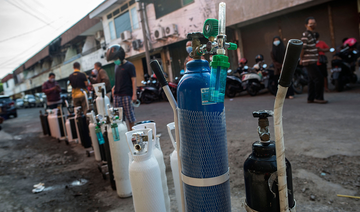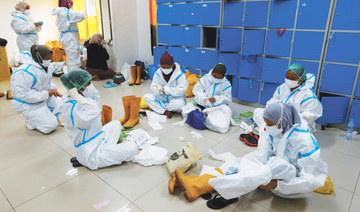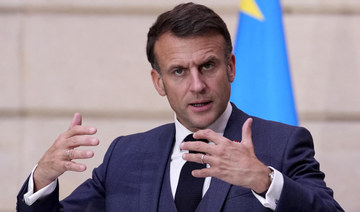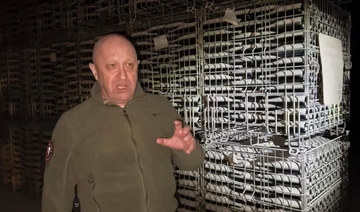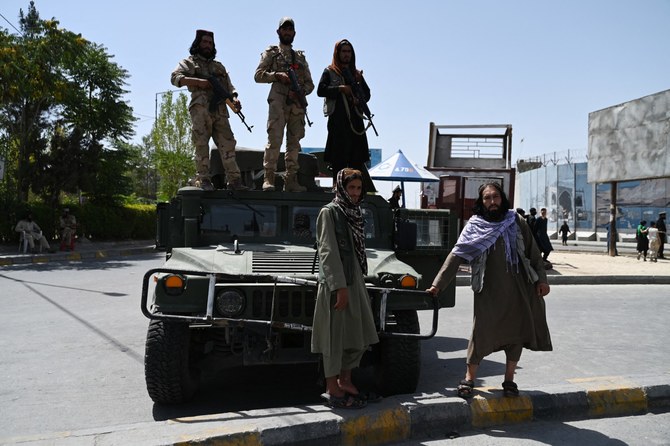JAKARTA: Muslims across Indonesia marked a grim Eid Al-Adha festival for a second year Tuesday as the country struggles to cope with a devastating new wave of coronavirus cases and the government has banned large gatherings and toughened travel restrictions.
Indonesia is now Asia’s COVID-19 hot spot with the most confirmed daily cases, as infections and deaths have surged over the past three weeks and India’s massive outbreak has waned.
Most of Indonesia’s cases are on the densely populated island of Java, where more than half of the country’s 270 million people live. Authorities in the world’s most populous Muslim-majority nation have banned many of the crowd-attracting activities that are usually part of Eid Al-Adha, the Feast of Sacrifice that marks the end of the annual Muslim pilgrimage to Makkah.
Authorities allowed prayers at local mosques in low-risk areas, but elsewhere houses of worship had no congregations, including Jakarta’s Istiqlal Grand Mosque, the largest in Southeast Asia.
Officials also banned the huge crowds that usually fill the yards of mosques to participate in ritual animal slaughter for the festival. Religious leaders urged the faithful to pray inside their homes and children were told to not go out to meet friends.
Indonesia’s health ministry reported 34,257 new coronavirus cases and 1,338 deaths on Monday, making it the country’s deadliest day since the start of the pandemic.
COVID-19 infections in Indonesia are at their peak last week with the highest daily average reported at more than 50,000 new infections each day. Until mid-June, daily cases had been running at about 8,000.
Overall, Indonesia has reported more than 2.9 million cases and 74,920 fatalities. Those figures are widely believed to be a vast undercount due to low testing and poor tracing measures.
The government put emergency restrictions in place on July 3 across Java island and the tourist island of Bali, limiting all nonessential travel and gatherings and shutting malls, places of worship and entertainment centers. They were set to end on Tuesday in time for the country to celebrate Eid Al-Adha.
But with the wave of infections still expanding, the government’s COVID-19task force issued a special directive for the holiday week that bans all public travel, communal prayers, family visits and gatherings across Java and Bali, and expanded the lockdown measures to 15 cities and districts outside the two islands that have recorded sharp increases in COVID-19 cases.
President Joko Widodo appealed to Muslims to perform Eid prayers and recitation of God is great at home with their families.
“In the midst of the current pandemic, we need to be willing to sacrifice even more,” Widodo told televised remarks on the eve of Eid. “Sacrificing personal interests and putting the interests of the community and others first,” he said.
Police set up highway checkpoints and blocked main roads for non-essential vehicles. Domestic flights and other modes of transportation were suspended, blocking people from making traditional family visits.
“This is unfair ... but we should follow for the sake of people’s safety,” said Eka Cahya Pratama, a civil servant in the capital, Jakarta. He said he has lost many relatives because of COVID-19, including his aunt and two uncles.
“I feel really sad, I really miss them on the day of Eid,” he said.
Indonesia’s current wave was fueled by travel during the Eid Al-Fitr festival in May and by the rapid spread of the more contagious delta variant that emerged in India. Hospitals are swamped and oxygen supplies are running out, with growing numbers of the ill dying in isolation at home or while waiting to receive emergency care.
With the health care system struggling to cope, even patients fortunate enough to get a hospital bed are not guaranteed oxygen.
Other Asian countries are also struggling to contain rapidly rising infections amid sluggish vaccination campaigns and the spread of the delta variant. Among them are Muslim-majority places like Malaysia, Bangladesh and the southernmost four provinces of Thailand.
Unlike Indonesia’s restrictions, Bangladesh controversially paused its coronavirus lockdown for eight days to mark Eid Al-Adha, and its millions of people are shopping and traveling this week, raising fears the holiday will cause a virus surge that will collapse its already-struggling health care system.
Malaysia also has struggled to control its outbreak, which has worsened despite being under a lockdown since June 1. Total cases have soared by 62 percent since June 1 to above 927,000. Hospitals, especially in the state of Selangor, have been overwhelmed, with some patients reportedly being treated on the floor due to a lack of beds, and corpses piling up in mortuaries. Vaccinations, however, have picked up, with nearly 15 percent of the population now fully inoculated.
Malaysian Prime Minister Muhyiddin Yassin urged Muslims to stay home and celebrate the holiday modestly. “I appeal to you all to be patient and abide by the rules because your sacrifice is a great jihad in Allah’s sight and in our effort to save lives,” he said in a televised speech on the eve of the festival.
Indonesia began vaccinating aggressively earlier than many countries in Southeast Asia. About 14 percent of its population have had at least one dose, primarily China’s Sinovac. But that may leave them susceptible, since Sinovac may be less effective against the delta variant. Both Indonesia and Thailand are planning booster shots of other vaccines for their Sinovac-immunized health workers.
In Indonesia, land continues to be cleared for the dead as daily burials at dedicated graveyards for COVID-19 victims have increased 10-fold since May in Jakarta alone, according to government data.
Families wait turns to bury their loved ones as gravediggers work late shifts. Last year, Indonesia’s highest Islamic clerical body issued a decree that mass graves — normally forbidden in Islam — would be permitted during the pandemic.
Indonesian Muslims mark grim Eid amid devastating virus wave
https://arab.news/jwpbb
Indonesian Muslims mark grim Eid amid devastating virus wave
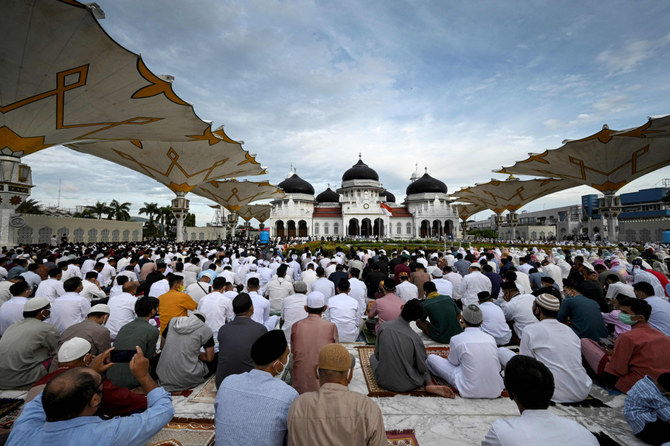
- Most of Indonesia’s cases are on the densely populated island of Java, where more than half of the country’s 270 million people live
UK says to expel Russian defense attache as ‘undeclared military intelligence officer’
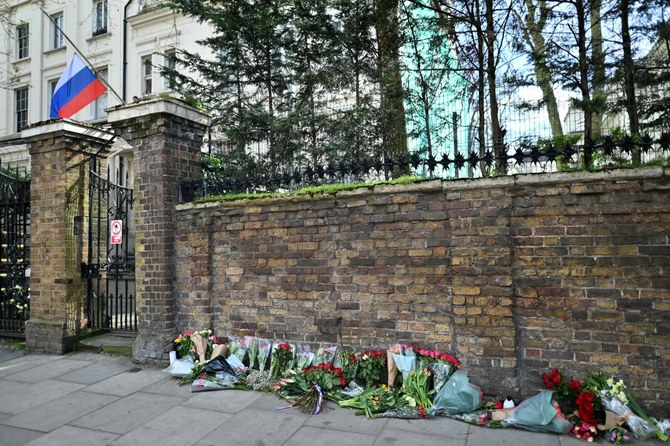
- Interior minister James Cleverly told parliament the UK would also remove the diplomatic status of several Russian-owned properties
- UK is currently a staunch NATO backer of Ukraine
London: The UK government on Wednesday raised tensions with the Kremlin by announcing it would expel a Russian defense attache for being “an undeclared military intelligence officer.”
Interior minister James Cleverly told parliament the UK would also remove the diplomatic status of several Russian-owned properties, including one in Sussex, southern England, and another in London “which we believe have been used for intelligence purposes.”
There would also be new restrictions on Russian diplomatic visas such as a cap on the length of time Russian diplomats can spend in the UK, he added.
The move comes with the UK concerned at an apparent increase in “malign” Russian activity on UK soil, including an arson attack on a Ukrainian-linked business allegedly orchestrated by the Kremlin.
A British man who it is claimed has links to the Wagner Group was charged in connection with that case last month.
London has previously accused Moscow of being behind the poisoning of two Russian former agents on UK soil, and of a spate of cyberattacks and disinformation campaigns.
The UK is currently a staunch NATO backer of Ukraine, providing training for troops and military equipment in the fightback against Russia.
Cleverly said the new package of measures was intended “to make clear to Russia that we will not tolerate such apparent escalations.”
He warned that Moscow would make accusations of Russophobia and spread conspiracy theories in response to his announcement.
“This is not new and the British people and the British Government will not fall for it, and will not be taken for fools by (President Vladimir) Putin’s bots, trolls and lackeys.
“Russia’s explanation was totally inadequate. Our response will be resolute and firm.
“Our message to Russia is clear: stop this illegal war, withdraw your troops from Ukraine, cease this malign activity.”
Four arrested for duping young Indian men into fighting for Russia in Ukraine
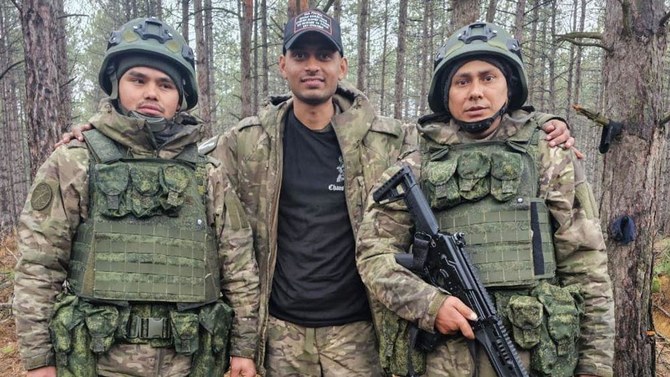
- Families of two Indian men who were killed in the war said that they had gone to Russia expecting to work as ‘helpers’ in the army
- At least 200 Nepalis are estimated to be serving in the Russian army and about 100 are missing
NEW DELHI: Indian police said four people linked to a network of human traffickers have been arrested on suspicion of luring young men to Russia with the promise of lucrative jobs or university places only to force them to fight in the war in Ukraine.
About 35 Indian men were duped in this manner, the Central Bureau of Investigation (CBI) said in March.
The four Indian nationals arrested were a translator, a person facilitating visa processing and the booking of airline tickets as well as two “main recruiters” for the southern states of Kerala and Tamil Nadu, the CBI said late on Tuesday.
The investigation “is continuing against other accused persons who are part of this international network of human traffickers,” the CBI said.
The families of two Indian men who were killed in the war have told Reuters they had gone to Russia expecting to work as “helpers” in the army.
India’s foreign ministry says each case has been “strongly taken up” with Russia. Moscow has not responded to repeated requests from Reuters for comment.
Other South Asian countries have also warned their citizens against such trafficking networks after multiple cases emerged of people being similarly duped into fighting in the Russian army.
Sri Lanka said on Wednesday that “a number” of its retired war veterans were lured to the Russia-Ukraine war front with the promise of a “handsome salary,” citizenship, and other benefits for serving in the army, none of which were granted.
“A significant number of war veterans have died and sustained injuries on the battlefield,” Sri Lanka’s Defense Ministry said, adding that the law would be “strictly enforced” in the matter.
A retired major and an employment agent have been arrested in this connection.
Nepal, which paused issuing work permits for Russia and Ukraine in January, has said several young unemployed Nepalis had been illegally recruited into the Russian army by agents who charged them hefty sums for visas.
At least 200 Nepalis are estimated to be serving in the Russian army and about 100 are missing, officials have said.
India has refused to condemn Russia over the war, calling instead for dialogue and diplomacy to end the conflict. The two countries have enjoyed a close relationship for decades, trading in items from fighter jets to tea.
India has also increased its purchase of cheap Russian oil since the war, with Moscow emerging as its top oil supplier in the last financial year for the second year in a row.
Police clearing Pro-Palestinian tent encampment at George Washington University, dozens arrested
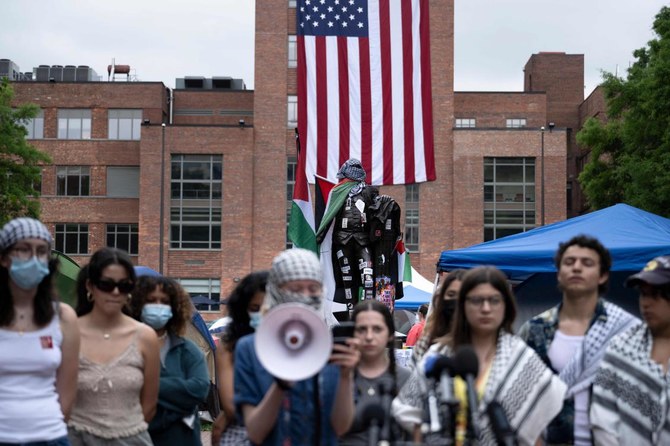
- A pro-Palestinian tent encampment was cleared at the University of Chicago on Tuesdday
- Tensions have continued to ratchet up in standoffs with protesters on campuses across the US
WASHINGTON: Police began to clear a Pro-Palestinian tent encampment at George Washington University early Wednesday and arrested dozens of protesters, hours after dozens left the site and marched to President Ellen Granberg’s home.
Officials at the university in Washington, D.C., had warned of possible suspensions for students engaging in protest activities on University Yard.
“While the university is committed to protecting students’ rights to free expression, the encampment had evolved into an unlawful activity, with participants in direct violation of multiple university policies and city regulations,” the university said in a statement.
Local media had reported that some protesters were pepper sprayed as police stopped them from entering the encampment and nearly 30 people had been arrested, according to community organizers.
In a statement, the District of Columbia’s Metropolitan Police Department said arrests were made for assault on a police officer and unlawful entry, but a number of arrests wasn’t immediately given. The department said it moved to disperse demonstrators because “there has been a gradual escalation in the volatility of the protest.”
Tuesday evening, protesters carrying signs that read, “Free Palestine” and “Hands off Rafah,” marched to Granberg’s home. Police were called to maintain the crowd. No arrests were made.
This comes as Mayor Muriel Bowser and MPD Chief Pamela Smith are set to testify about the District of Columbia’s handling of the protest at a House Committee on Oversight and Accountability hearing on Wednesday afternoon.
A pro-Palestinian tent encampment was cleared at the University of Chicago on Tuesday after administrators who had initially adopted a permissive approach said the protest had crossed a line and caused growing concerns about safety.
University President Paul Alivizatos acknowledged the school’s role as a protector of freedom of speech after officers in riot gear blocked access to the school’s Quad but also took an enough-is-enough stance.
“The university remains a place where dissenting voices have many avenues to express themselves, but we cannot enable an environment where the expression of some dominates and disrupts the healthy functioning of the community for the rest,” Alivizatos wrote in a message to the university community.
Tensions have continued to ratchet up in standoffs with protesters on campuses across the US — and increasingly, in Europe — nearly three weeks into a movement launched by a protest at Columbia University. Some colleges cracked down immediately on protests against the Israel-Hamas war. Among those that have tolerated the tent encampments, some have begun to lose patience and call in police over concerns about disruptions to campus life, safety and the involvement of nonstudents.
Since April 18, just over 2,600 people have been arrested on 50 campuses, figures based on AP reporting and statements from universities and law enforcement agencies.
But not all schools are taking that approach, with some letting protesters hold rallies and organize their encampments as they see fit.
The president of Wesleyan University, a liberal arts school in Connecticut, has commended the on-campus demonstration — which includes a pro-Palestinian tent encampment — as an act of political expression. The camp there has grown from about 20 tents a week ago to more than 100.
“The protesters’ cause is important — bringing attention to the killing of innocent people,” university President Michael Roth wrote to the campus community Thursday. “And we continue to make space for them to do so, as long as that space is not disruptive to campus operations.”
The Rhode Island School of Design, where students started occupying a building Monday, affirms students’ rights to freedom of speech and peaceful assembly and supports all members of the community, a spokesperson said. The school said President Crystal Williams spent more than five hours with the protesters that evening discussing their demands.
On Tuesday the school announced it was relocating classes that were scheduled to take place in the building. It was covered with posters reading “Free Palestine” and “Let Gaza Live,” and dove was drawn in colored chalk on the sidewalk.
Campuses have tried tactics from appeasement to threats of disciplinary action to resolve the protests and clear the way for commencements.
At the University of Chicago, hundreds of protesters gathered for at least eight days until administrators warned them Friday to leave or face removal. On Tuesday, law enforcement dismantled the encampment.
Officers later picked up a barricade erected to keep protesters out of the Quad and moved it toward the demonstrators, some of whom chanted, “Up, up with liberation. Down, down with occupation!” Police and protesters pushed back and forth along the barricade as the officers moved to reestablish control.
Dozens detained at Paris pro-Palestinian university protest
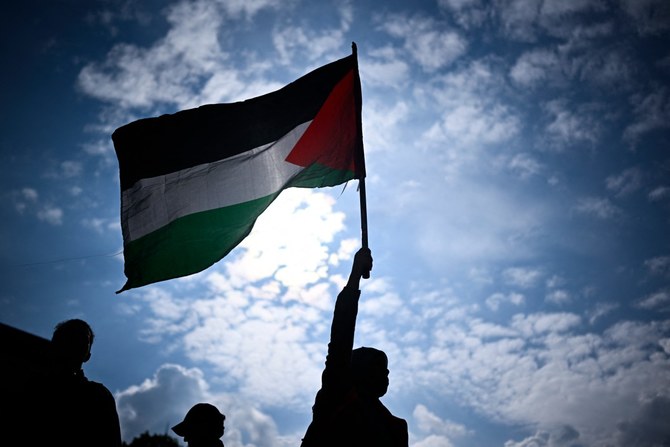
- Prime Minister Gabriel Attal said there would never be a right to disrupt France’s universities with such protests
- Police acted after about 100 students had been occupying a lecture theater for two hours
Paris: French police detained 86 people following an operation to remove students staging a pro-Palestinian occupation at the Sorbonne university in Paris, prosecutors said Wednesday.
Those arrested in the police operation on Tuesday night were being held for a variety of public order offenses, said the statement.
They include wilful damage, rebellion, violence against a person holding public authority, intrusion into an education establishment and holding a meeting designed to disrupt order. Some are also being held for participation in a group with a view to preparing violence or damage to property.
They can be held for an initial 24 hours, which can then be extended another 24 hours.
The day before police moved in, Prime Minister Gabriel Attal said there would never be a right to disrupt France’s universities with such protests.
Police acted after about 100 students had been occupying a lecture theater for two hours in “solidarity” with the people of Gaza, an AFP journalist on site noted.
Tuesday night’s police operation at the Sorbonne — and at another university on Paris’s Left Bank, Science Po university — followed interventions to end similar protests at the end of April.
Students at universities in several European countries have followed the actions on US campuses where demonstrators have occupied halls and facilities to demand an end to partnerships with Israeli institutions because of Israel’s punishing assault on Gaza.
Police have also intervened to clear campuses in the United States, Netherlands and Switzerland.
Palestinian militant group Hamas on October 7 attacked southern Israel, resulting in the deaths of about 1,170 people, mostly civilians, according to an AFP tally of Israeli official figures.
Israel estimates that 129 hostages seized on October 7, out of the 253 taken, are still being held in Gaza, including 34 the military says are dead.
Israel’s retaliatory offensive has killed at least 34,789 people in Gaza, mostly women and children, according to the health ministry in the Hamas-run besieged Palestinian territory.




